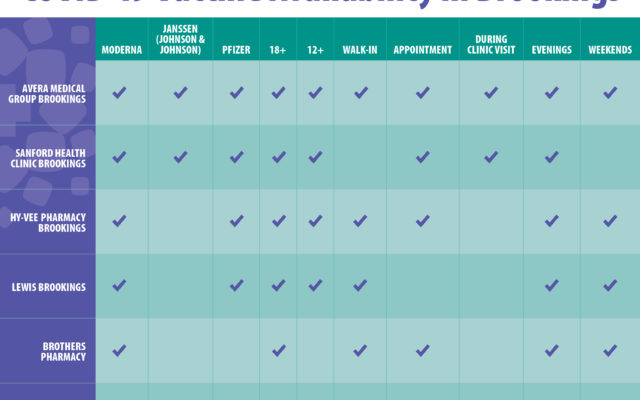Brookings Health Reminds Community to Continue to Stay Vigilant Against COVID-19

Brookings Health System reminds the community to continue to stay vigilant against COVID-19, practicing the necessary safety precautions and getting vaccinated, especially considering the Delta variant.
“The Delta variant has the capability to infect 5-7 people versus the original virus infecting around 2-3 people,” said Infection Preventionist Bunny Christie. “This is significant because most people are unknowingly shedding virus two days prior to the onset of symptoms which increases their likelihood to infect more people before they are isolated.”
According to the Centers for Disease Control and Prevention (CDC), the COVID-19 Delta variant is highly contagious, more than 2x as contagious as previous variants. The greatest risk of transmission is among unvaccinated people who are much more likely to get infected, and therefore transmit the virus. The COVID-19 vaccine is highly effective at preventing severe disease and death, including against the Delta variant.
“Currently, South Dakota Department of Health reported that less than 1% of all COVID-19 infections are breakthrough infections; breakthrough infections are considered infections in those who are fully vaccinated,” said Christie. “This means that almost all of the current COVID infections and hospitalizations are occurring in unvaccinated people.”
COVID-19 vaccinations provide a safer way to immunity by avoiding severe risks and complications created by the COVID-19 virus. The Department of Health has opened vaccinations to all South Dakotans age 12 and older. In Brookings, vaccines are currently being distributed through local clinics and pharmacies including:
- Avera Medical Group Brookings
- Sanford Health Brookings Clinic
- Hy-Vee Pharmacy Brookings
- Lewis Brookings
- Brothers Pharmacy Brookings
- Walmart Pharmacy Brookings
Combining the vaccine with other safety measures, including mask wearing, social distancing and frequent hand washing, provides the best opportunity for stopping the pandemic. Information on vaccine types, ages served and times at local clinics and pharmacies can be found online at brookingshealth.org/Vaccine.
According to the CDC, the COVID-19 virus spreads mainly from person-to-person contact. The virus is primarily carried by respiratory droplets which are formed when an infected person coughs, sneezes or talks. The droplets can land in the mouths or noses, or possibly be inhaled into the lungs, of people within six feet of the infected person.
The best prevention is to get vaccinated. Additionally, infection control precautions to prevent exposure include:
- Practice good respiratory etiquette and hygiene. Cover your coughs and sneezes with a tissue. If a tissue is not available, cough or sneeze in your upper sleeve.
- Avoid touching your eyes, nose and mouth with unwashed hands.
- Wash your hands often with soap and water for at least 20 seconds. If soap and water are not available, use an alcohol-based sanitizer that contains at least 60% alcohol.
- Practice social distancing when out in the community by trying to stay six feet away from other people. Do not hug, kiss, shake hands or make other unnecessary contact.
- Wear a cloth face covering that snugly covers both your mouth and nose in public settings, especially in situations where you may be closer than six feet to people.
- Clean and disinfect high-touch surface areas, such as counters, tabletops, doorknobs, bathroom fixtures, toilets, phones, keyboards, tablets, etc. every day. COVID-19 is easily cleaned by household cleaners or soap and water.
- Monitor your health. Be alert for COVID-19 symptoms and take your temperature if symptoms develop.
- Stay at home if you’re sick and self-isolate to prevent the spread of illness.
According to the CDC, COVID-19 symptoms may appear 2 to 14 days after exposure to the virus. Most people typically experience mild to severe respiratory illness with symptoms of fever, cough and shortness of breath. Other symptoms may include:
- Chills
- Fatigue
- Muscle or body aches
- Headache
- New loss of taste or smell
- Sore throat
- Congestion or runny nose
- Nausea or vomiting
- Diarrhea
Individuals who have been in close contact (within 6 feet of someone for a cumulative total of 15 minutes or more over a 24-hour period) with someone who has COVID-19 should quarantine unless fully vaccinated. Individuals who are fully vaccinated do not need to quarantine unless they have symptoms. The CDC recommends that fully vaccinated people get tested 3-5 days after their exposure and wear a mask indoors until receiving a negative test result. If individuals have symptoms, they should immediately self-isolate and contact their primary care provider.
Individuals with symptoms should also get tested for COVID-19. Symptoms healthcare providers look for when they test include fever greater than 100.4°F, cough, shortness of breath OR one of the previously listed symptoms that cannot be attributed to another condition.
If quarantine is necessary, individuals should:
- Stay home for 14 days after your last contact with a person who has COVID-19.
- Watch for fever (100.4◦F), cough, shortness of breath, or other symptoms of COVID-19.
- If possible, stay away from people you live with, especially people who are at higher risk for getting very sick from COVID-19.
More information on COVID-19, what the public can do, and how Brookings Health System is responding to the pandemic can be found at brookingshealth.org/COVID.
September 13, 2021



